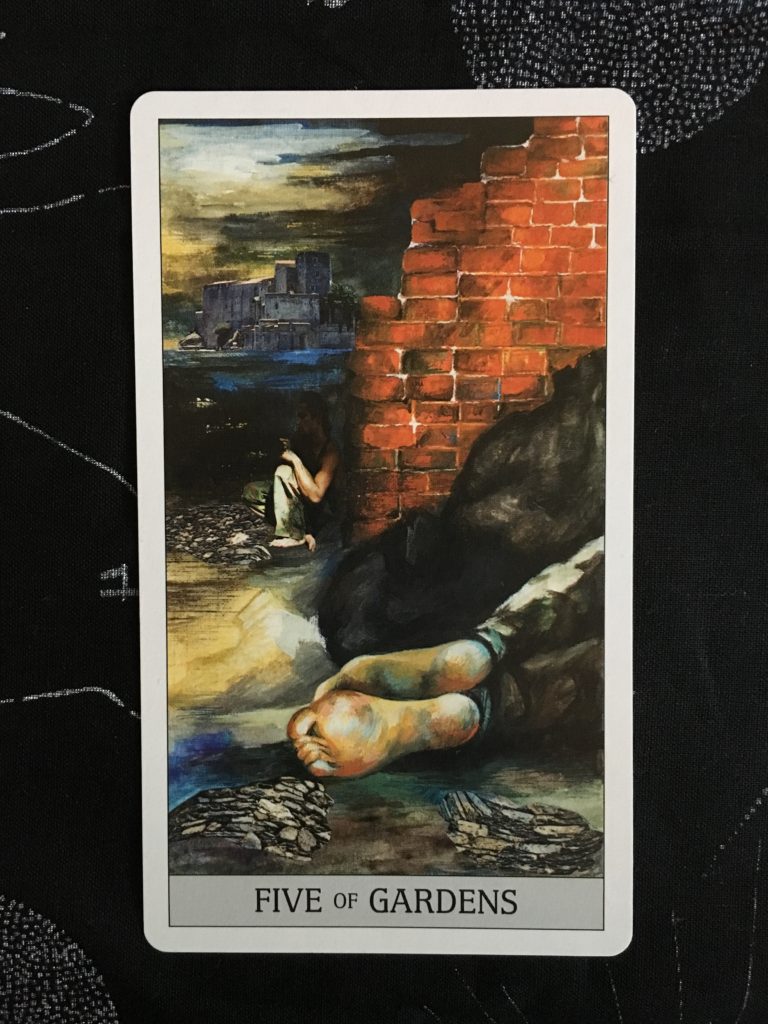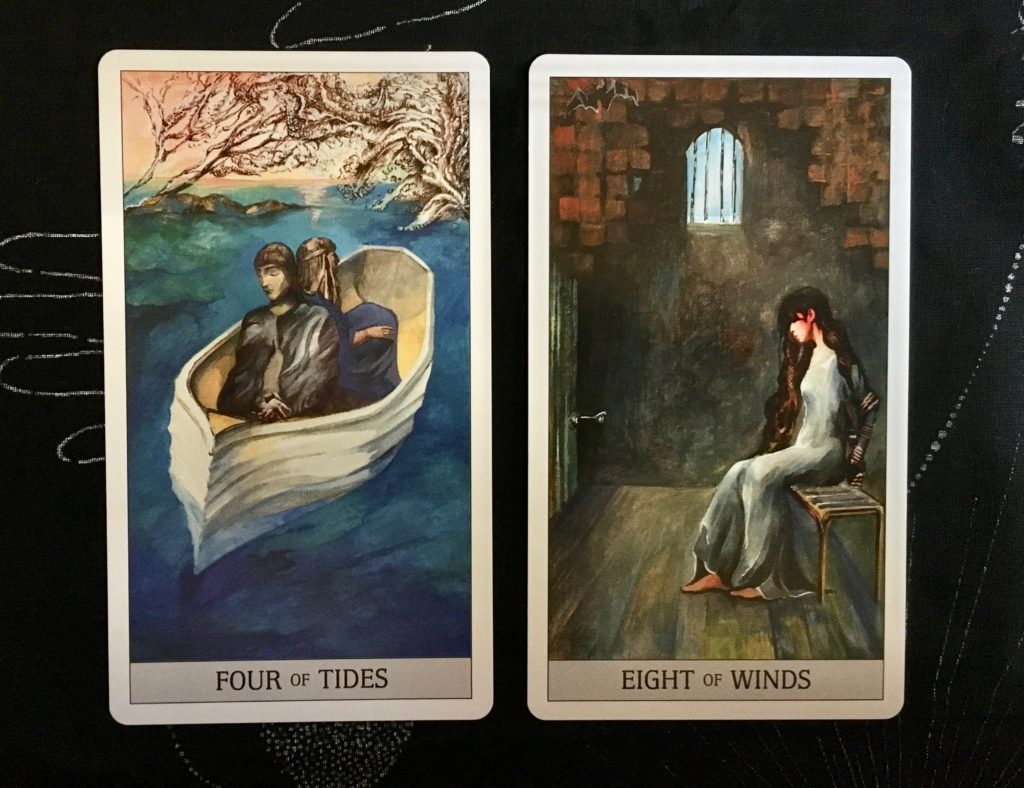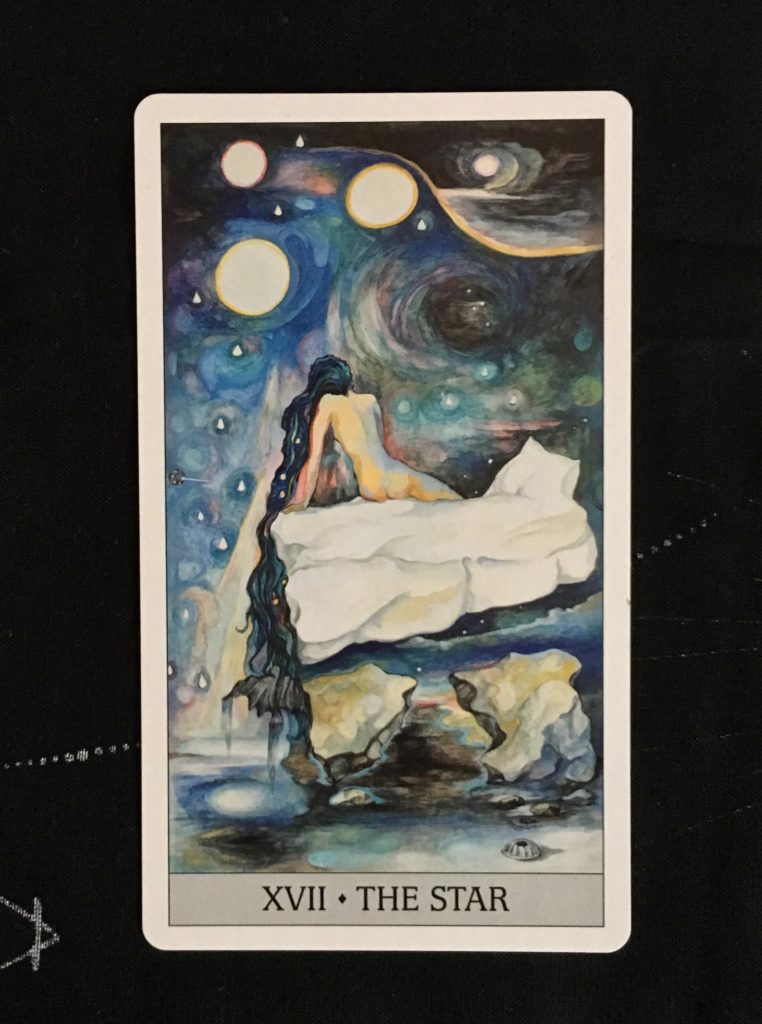I don’t use tarot to predict the future. Rather, I often use tarot as a tool for introspection, in order to get clarity on a situation and spark some ideas about what to do about it. This style of tarot reading is meant to feel empowering, and can take on a self-help vibe. It makes me feel like I’m in control of my own destiny. And isn’t that what we want?
But this inspirational style of tarot reading can have its own pitfalls. Once I was giving a reading for someone, and the Five of Pentacles came up. The card usually signifies hardship and scarcity, but often comes bundled with an implication that there is a way out, someone who might help, a resource you could tap into. I’ve seen interpretations of the card where the seeker is framed as possibly too proud to ask for help. And indeed, it feels more empowering to think that overcoming scarcity is a matter of will. But in this particular reading, I paused. I knew this person feared material scarcity because they had experienced material scarcity in their own life. Their worry made sense. It was entirely logical. Suddenly “you can find help if you are willing to ask for it” sounded less like empowerment and more like a dismissal of the seeker’s personal history and reality. Would that message be helpful, or condescending?

Sometimes the cards give clear and reasonable advice, but the advice isn’t always so easy to carry out. I pulled the Ten of Wands for a friend who had been taking on heavy burdens for a long time. The advice here is often to delegate, to set the burdens aside, to move on to something new. This person absolutely deserved a break, and truly needed to prioritize their own needs more. But I also knew that other people depended on this person, and that attempts to move out of a caretaking role had not gone smoothly. Setting the wands down might not feel like an option yet. So I acknowledged the weight that they carried. Shifting their responsibilities was a long-term goal. Eventually they would have to find ways, for their own sake, to lighten that load, but I understood why they felt that they couldn’t yet.
The Four of Cups shows up for someone in deep depression. “Take care of your depression.” It’s the obvious thing to do. But being depressed makes it difficult to take steps to deal with that depression. Judgement appears for someone who needs to forgive. But it’s not so easy to forgive deep wrongs or years of damage. The Eight of Swords turns up for someone who’s feeling anxious. “It’s all in your mind!” Sure it is! That doesn’t necessarily mean it’s not real.
Are you trying hard enough yet?

We want to find the silver lining or the way out of the “bad” cards. I do think that’s important. But it’s also important just to acknowledge when things are hard. The danger of overemphasizing “the power of positive thinking” is that while it can feel empowering, it can also feel shaming. Can you “positive think” yourself out of health issues, or your own brain chemistry, or systemic inequality? Oh, you can’t? Congratulations, you’ve failed and it’s your own fault. We see the cheerful bleakness of this approach taken to extremes in The Book of Mormon and Elder McKinley’s peppy ode to thought suppression, “Turn It Off.” The trauma of an abusive household, guilt, illness, and sexuality can all be overcome through ignoring them completely (supplemented with a little tap dance, of course). If it doesn’t work, the failure rests on the individual, not the method. “You’ve only got yourself to blame,” sings Elder McKinley, “You didn’t pretend hard enough.”
When it comes to systemic issues like poverty or institutionalized racism, we need to acknowledge that these problems exist in order to deal with them. So how do we survive in these systems day to day? How do we find the energy and develop strategies to fight for change? And while we can take responsibility for dealing with personal issues like behavioral patterns, that can take hard work. So how do we find the motivation to do that work, and find help when we need it, and treat ourselves with compassion? Empowerment doesn’t mean ignoring problems, or imagining that we can wave them away. It means acknowledging problems, and doing our best to work through them.
I do use tarot as self-empowerment tool, and I do believe it’s been tremendously helpful. Tarot is my daily self-motivator, a way to consciously choose the way I want to live that day. Today I will be the Chariot, boldly driving forward! Today I will be the Queen of Swords, blatantly honest! Today I will be the Emperor, making plans and following through! Sometimes it works, but sometimes it falls flat, and that’s okay. Sometimes, the cards can simply affirm difficulty: yes, this feels hard. Yes, this is challenging. Yes, these feelings are valid and it is okay to feel them. And sometimes tarot asks me to do the hard stuff. Today, the Nine of Swords asked me to make friends with my fears in the light of day. One of the things I am afraid of, as I write this, is driving people away by bursting the bubble of positivity. But I’m also afraid of implicitly shaming people for not being able to magically fix their lives through optimism alone.
Inspiration can be useful. Often we have to believe we can do something before we can actually do it. But sometimes we tackle a problem armed with belief and desire and all the optimism we can muster, and it just doesn’t work. It’s okay to try and fail. When I use tarot to inspire myself, I really do mean it. YES! I am going to do the thing! And if I do the thing, that’s great. If I don’t do the thing, I still have worth. I still get to exist. And, if I want to, I get to try again. I get to fail as many times as I have to. Failure can be valuable, too.
Tarot can help me pay attention to my own needs and the needs of others. It can help me clarify a situation and game out possible courses of action. None of that necessitates glossing over our problems. We don’t have to rush to solutions so fast that we forget to acknowledge real hardship, real pain. That’s part of the process. You can “positive think” your way out of some things, maybe, but not everything, and not all at once. When I get motivational, and I do get motivational, I’m not dismissing difficulty. I’m doing my best to work in and with and through the difficulty. That feels like empowerment to me.


